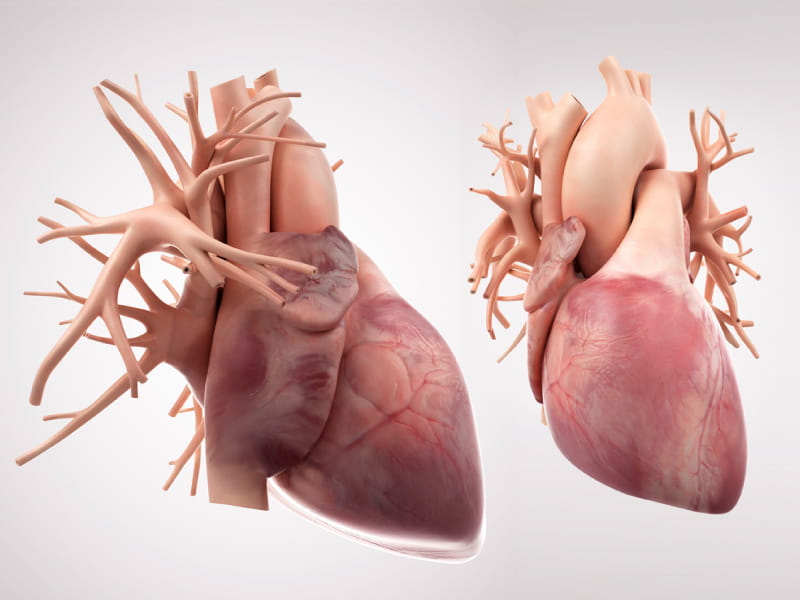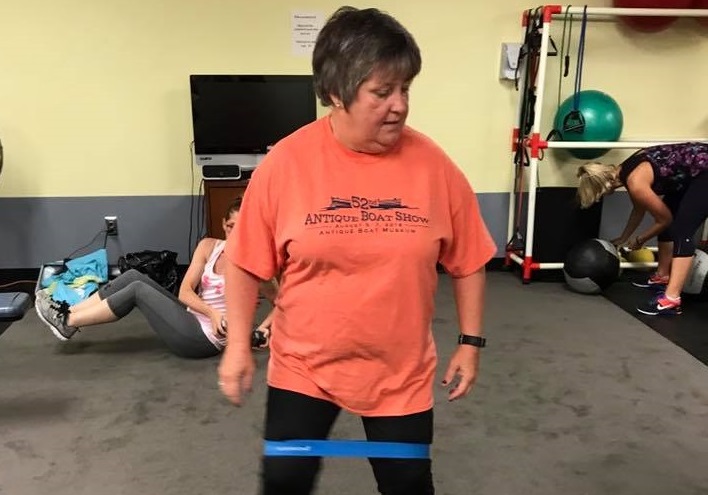8 things that can affect your heart – and what to do about them
By American Heart Association News

Debby Schrecengast's blood pressure was "through the roof." She had gained a lot weight. A history of heart disease ran deep in her immediate family.
When she looks back at herself in 2014, the year she suffered a stroke, she sees a "stubborn old donkey" in denial about her health.
"I had let my blood pressure go uncontrolled and I remained overweight for so long," said Schrecengast, 56. "There's some damage that I can't undo. Now, I try to keep it from getting worse."
Schrecengast, who lives in LaFargeville, New York, eased back into an exercise routine at her local YMCA. She took nutrition classes and spent evenings swapping healthy recipes.
Since then, she's dropped 30 pounds and has run a half-marathon. She no longer needs blood pressure medicine.

"I know now I have to be diligent," she said. "This really isn't, 'I have to be good for six months or I have to be good for a year.' I have to be good forever."
Genetics can play a role in cardiovascular health, but so can lifestyle changes. Here are eight factors than can affect the heart and what to do about them:
1. Cholesterol
What to know: "Bad" LDL cholesterol can clog up the arteries that feed your heart and brain – and increase heart attack and stroke risk. "Good" HDL cholesterol can help eliminate the bad, but only to an extent. The body also takes in additional cholesterol from certain foods – like meat, eggs and dairy.
What to do: Get a blood test and know your cholesterol levels. Then, work with your health care provider on what changes might be needed. Switching to a low-fat diet can help lower LDL cholesterol. Getting more regular exercise can elevate levels of good HDL.
2. Resting heart rate
What to know: Lower is better. For most people, a resting heart rate between 60 and 100 beats per minute is considered normal. It's affected negatively by stress, hormones and medication. Getting into better shape can not only lower your resting heart rate, it could help save your life: Studies have shown a higher rate is associated with higher risk for death, even among people who don't have traditional heart disease risk factors.
What to do: Check your heart rate at rest, preferably first thing in the morning, before getting out of bed.
3. Cardiorespiratory fitness
What to know: Aerobic exercise can get the heart pumping and build endurance. Growing evidence over the past three decades has shown that low levels of cardiorespiratory fitness are associated with an increased risk of cardiovascular diseases and death. High levels are linked to a lower risk of developing dementia, Alzheimer's disease, diabetes and even some types of cancer.
What to do: A health care provider can assess your cardiovascular endurance and overall fitness. It is often measured using the VO2 max, the maximum amount of oxygen a person can take in during intense aerobic exercise.
To increase cardiorespiratory fitness, go for a run or hop on a bike. Take a brisk walk or turn up the music and start dancing. Any type of aerobic exercise that increases breathing and heart rate has the ability to build your endurance if done regularly. If you haven't been active for a while, start slowly and gradually build.
4. Blood pressure
What to know: High blood pressure, or hypertension, often is called the "silent killer" because it usually lacks obvious symptoms. Nearly half of all U.S. adults have high blood pressure, yet many people are unaware. When left uncontrolled, it is a major risk factor for heart attack, stroke and heart failure.
What to do: Learn your numbers and what they mean. High blood pressure is defined as a reading of 130 or higher for the top number, or 80 or higher for the bottom number. Make sure to take measurements regularly to detect patterns and recognize when numbers creep up.
5. Blood glucose level
What to know: Blood sugar levels can fluctuate depending on time of day, what you eat and when you ate it. Too high or too low a level can affect your concentration, make you dizzy, and harm vital organs. Diabetes develops when there is too much sugar in the blood because the body either fails to make enough insulin or cannot use it efficiently.
What to do: Type 2 diabetes is associated with obesity and physical inactivity. Diet and exercise can lower the odds of developing it or slow its progression. A low-fat diet that cuts back on sweets, added sugars and processed meats can help keep blood sugar levels steady.
6. Waist circumference
What to know: Some experts consider the distance around your natural waist a better way to measure body fat than relying on body mass index alone. Someone with a relatively low BMI score may have a large waist, and people who carry fat around their abdomen as opposed to the hips or elsewhere are at greater risk for heart disease and Type 2 diabetes. A high waist circumference also is associated with increased risk for high blood pressure and elevated cholesterol levels.
The AHA recommends adults get both their BMI and waist circumference measured each year. BMI alone may not be enough to diagnose obesity, especially in some minority groups.
What to do: Grab an old-fashioned tape measure and wrap it around your waist while standing. Place the tape measure just above your hipbones. Then, exhale and record the measurement. Men should aim for less than 40 inches, while women should shoot for less than 35 inches.
7. Heart rhythm
What to know: Atrial fibrillation, or AFib as it's often called, is a quivering or irregular heartbeat. Left untreated, it doubles the risk for heart-related death and has a fivefold increased risk for stroke.
What to do: If you recognize the common AFib symptoms – including weakness, shortness of breath, dizziness, heart palpitations or an irregular heartbeat – see your doctor. Treatment depends on the underlying medical issue that may be causing the AFib and could include medications and procedures to help restore a normal rhythm.
8. Family history
What to know: Family history is considered a "risk-enhancing factor," according to recent cholesterol management guidelines. That means if a parent, grandparent or sibling has had a stroke, heart attack or other type of heart disease, the information should be shared with your doctor as soon as possible.
Genetic factors such as race also may be in play. High blood pressure, for example, is a major heart disease risk factor, and its prevalence among black Americans is among the highest in the world.
What to do: If you don't know a relative's full medical story, seek out family who do. Details such as how old someone was when heart disease first developed can be critical. Family history can give your health care provider a better perspective on your overall risk for cardiovascular disease in the future.
If you have questions or comments about this story, please email [email protected].





